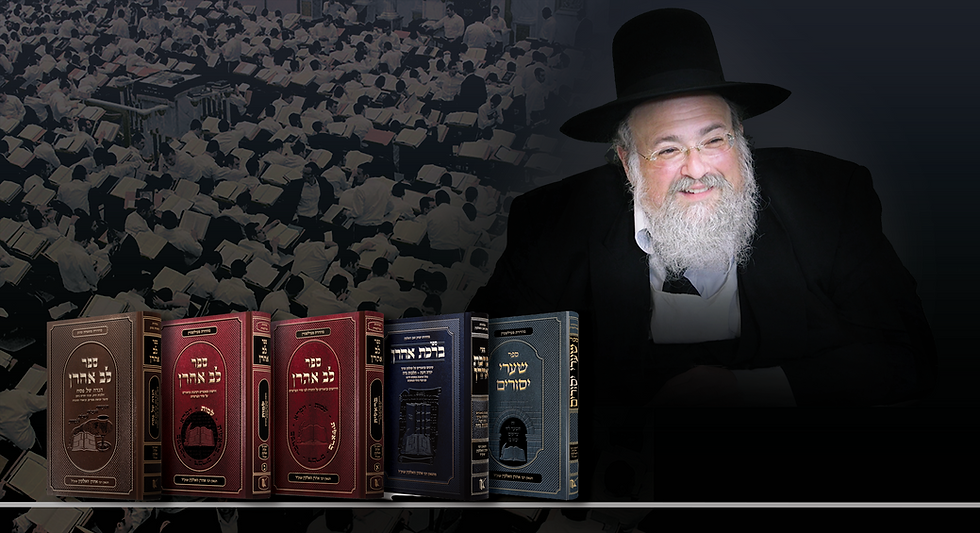Yom Kippur- Judgment and Mercy
- Shlomo Walkin

- Oct 6, 2024
- 6 min read

The Essence of Yom Kippur
Let us delve into the significance of Yom Kippur and explore the essence of this sacred day. Every Jew harbors a connection to Yom Kippur. The Sefarim refer to the ten days between Rosh Hashanah and Yom Kippur as the "Aseres Yemei Teshuvah," calling them "Yemei HaRachamim veHaRatzon" (Days of Mercy and Favor). Indeed, rachamim is a central theme of the Yamim Noraim. To deepen our understanding of this period, let us examine the concept of rachamim and the significance of these holy days.
A Yom Kippur Jew
We begin with the words of the Ramban in his commentary on the Torah, where he articulates the essence of these days with remarkable clarity: Rosh Hashanah represents "din b'rachamim" (judgment tempered with mercy), while Yom Kippur embodies "rachamim b'din" (mercy within judgment). The depth of this distinction is profound, and many commentators explore its meaning extensively. In keeping with our method of seeking a heartfelt understanding, we will aim to explain this distinction in a manner that speaks directly to the heart, guiding us in our preparation for the avodah of Yom Kippur.
As noted, Jews worldwide—even those distant from religious observance—feel connected to Yom Kippur. The term "a Yom Kippur Jew" is often used with a negative connotation, implying someone whose sole connection to Judaism is Yom Kippur. However, we prefer to focus on the positive. This expression reflects the deep bond that Jews feel with this holy day, demonstrating that Yom Kippur and the Jewish soul are intertwined.
"Avi" – My Father, A Symbol of Mercy
To further our understanding of the rachamim of Rosh Hashanah and Yom Kippur, let us first consider Rosh Hashanah. A central theme of Rosh Hashanah is the Akeidas Yitzchak. The Midrash offers a fascinating insight into this episode, highlighting how Yitzchak repeatedly calls out to his father, Avraham, with the word "Avi!"—"my father!" The Midrash questions why Yitzchak needed to address Avraham as his father, something seemingly obvious from the context. It answers that Yitzchak sought to arouse his father's compassion through this plea, seeking to "touch a chord" of rachamim within him.

The Akeida and the Expression of Love
The question arises: What was Yitzchak trying to achieve by appealing to his father's mercy? It is unlikely that he was attempting to dissuade Avraham from fulfilling the divine command, as it would be inconceivable for Avraham to defy Hashem's direct order. Yitzchak undoubtedly understood this as well. So what was his intention?
The Brisker Rav offers a profound insight. When Hashem commanded Avraham to offer Yitzchak as a korban, He specifically stated: "kach na et bincha… asher ahavta"—"take your son… whom you love." Hashem wanted Avraham to sacrifice Yitzchak, his beloved son, with full awareness of his love for him. The Brisker Rav explains that Yitzchak knew Avraham would have to suppress his natural paternal love to fulfill this command. However, Yitzchak wanted Avraham to feel that love intensely, ensuring that the act fully reflects the divine command to offer "the son whom you love." By calling out "Avi!," Yitzchak sought to evoke Avraham’s fatherly love, thereby ensuring that the sacrifice would be performed with complete devotion and love.
A Deeper Understanding: Mercy for Future Generations
Perhaps we can offer an additional explanation, one that is both emotionally stirring and profound. Yitzchak’s intention in appealing to his father’s mercy may have been to establish a precedent for future generations of Israel, invoking the concept of "m'orer rachamei ha'av al habanim"—arousing the father’s mercy for his children. The Midrash recounts that as Avraham prepared to sacrifice Yitzchak, "zolgu einav dima'ot"—tears flowed from his eyes. This indicates that Avraham, too, was engaged in laying the foundation of the Akeida as an eternal source of merit, invoking Hashem’s compassion on His beloved nation, Israel.
This may explain why, throughout the narrative of the Akeida, until the moment Avraham is commanded to refrain from the act, the Torah uses the name "Elokim," representing the attribute of strict justice (midas hadin). Only after Avraham is stopped by the angel does the Torah employ the name "Hashem," representing the attribute of mercy (midas harachamim), as it is written: "וַיִּקְרָ֨א אֵלָ֜יו מַלְאַ֤ךְ ה' מִן־הַשָּׁמַ֔יִם...". This highlights the transformative power of the Akeida to turn strict judgment into mercy.
The Akeida Is Rachamaim Not Din
Similarly, the bracha of shofaros that we recite on Rosh Hashana concludes with the words: "שומע קול תרועת עמו ישראל ברחמים"— "Who listens to the sound of the teru'ah of His people Israel with mercy." The sound of the shofar, symbolizing the ram used by Avraham Avinu at the akeida, has the capacity to invoke rachamim from Hashem upon us.
On a deeper level, we pray in the bracha of zichronos: "ועקדת יצחק לזרעו היום ברחמים תזכור"— "May You remember the akeida of Yitzchak on behalf of his descendants with mercy, today!" What is the significance of the emphasis on "today"? The Shelah offers an extraordinary insight: While the akeida indeed serves as a powerful source of defense, invoking rachamim for Klal Yisrael, it could also, potentially, bring about a din aspect. The akeida demonstrates the immense spiritual stature of the avos hakedoshim, which may highlight how distant we are from their level of devotion, their ahavas Hashem, and their willingness to sacrifice entirely for His sake. Therefore, on Rosh Hashana, we plead with Hashem: "Today," focus only on the rachamim aspect of the akeida, not the din.
sources:
Yom Kippur and Aseret Yemei Teshuvah:
Source for the term "Aseret Yemei Teshuvah" (Ten Days of Repentance):
Mishnah Yoma 8:8: Describes the process of atonement on Yom Kippur and the special nature of the ten days between Rosh Hashanah and Yom Kippur.
Rambam, Hilchot Teshuvah 2:6: Discusses the unique role of these ten days as a time when repentance is more readily accepted.
Rosh Hashanah as "Din b'Rachamim" and Yom Kippur as "Rachamim b'Din":
Source for Ramban’s commentary:
Ramban, Commentary on the Torah, Vayikra 23:24: Ramban explains the difference between Rosh Hashanah, which is a day of judgment tempered by mercy, and Yom Kippur, which is primarily mercy but within the context of judgment.
Additional Mefarshim: See Sefas Emet, Rosh Hashanah 5659 for a deeper analysis of these terms.
The Concept of a "Yom Kippur Jew":
Akeidat Yitzchak and "Avi" in the Midrash:
Source for the Midrash:
Midrash Rabbah, Bereishit 56:6: Explains Yitzchak’s repeated call to Avraham as an attempt to evoke his father's mercy during the Akeida.
The Brisker Rav’s Interpretation of the Akeida:
Source for the Brisker Rav’s explanation:
Haggadat Shel Pesach, Chiddushei HaGriz (Brisker Rav): Discusses the idea that Avraham was commanded to bring Yitzchak as a sacrifice with love, as referenced in the verse “asher ahavta.”
Rav Chaim Soloveitchik, Chiddushei HaGriz al HaTorah, Bereishit 22.
Tears of Avraham (Zolgu Einav Dima’ot):
Source for the Midrash:
Midrash Rabbah, Vayikra 29:9: Describes Avraham’s emotional state during the Akeida, including his tears as a sign of his deep compassion, while still fulfilling the divine command.
The Shift from "Elokim" to "Hashem":
Source for the name change in the Akeida:
Bereishit 22:1–13: The narrative itself presents the use of "Elokim" in the context of strict justice until the intervention of the angel, where the name "Hashem" is used, indicating mercy.
Rabbeinu Bachya, Commentary on Bereishit 22:12: Discusses the significance of this shift from midat hadin (judgment) to midat harachamim (mercy).
Bracha of Shofaros:
The phrase "שומע קול תרועת עמו ישראל ברחמים" is found in the Shofaros section of the Musaf prayer on Rosh Hashana. The connection between the sound of the shofar and invoking mercy relates to various Midrashic and halachic sources that associate the shofar with the ram of the akeida. One source is the Gemara in Rosh Hashana 16a, which discusses the shofar of Rosh Hashana as an instrument for arousing Divine mercy (rachamim).
Bracha of Zichronos and the phrase "ועקדת יצחק לזרעו היום ברחמים תזכור":
This is part of the Zichronos section of the Musaf on Rosh Hashana, which appeals to Hashem to remember the merits of the akeida. The phrase can be found in traditional Machzorim (High Holiday prayer books). The emphasis on “today” is explained in many commentaries.
Shelah’s Insight:
The idea that the akeida has a dual potential of invoking both rachamim and din comes from the Shelah HaKadosh (Shnei Luchot HaBrit, Rosh Hashana, Ner Mitzvah). The Shelah explains that the greatness of the avos can, at times, serve as a stark contrast to the shortcomings of their descendants, which could lead to a harsher judgment (din). This is why we plead for the focus to remain on the rachamim aspect.



























Comments